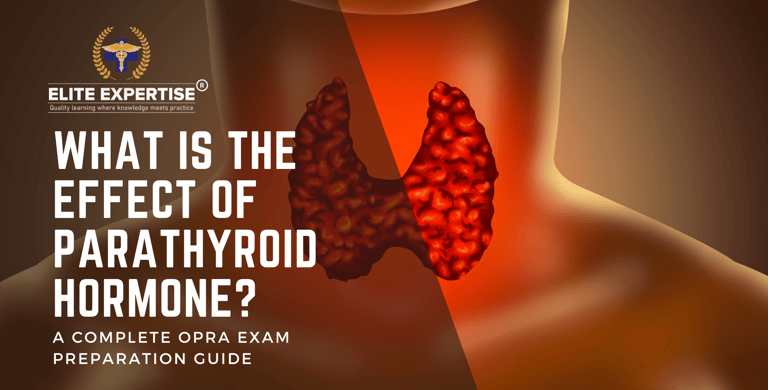ASK MY PHARMACIST | GOT QUESTIONS? Your pharmacist has answers. Click Here
Effect of Parathyroid Hormone (PTH): Functions, Disorders & OPRA Exam Guide 2025
Learn the effects of parathyroid hormone (PTH) on bones, kidneys, and intestines. Understand hyperparathyroidism, hypoparathyroidism, symptoms, mnemonics, FAQs, and key takeaways for OPRA exam preparation in 2025.
Krupa
9/27/20252 min read


Key Takeaways:
Two major glands of the endocrine system are Thyroid gland and parathyroid glands.
Thyroid gland is responsible for metabolism, calcitonin lowers calcium.
Parathyroid glands is responsible for balancing calcium-phosphate levels in blood
PTH(Parathyroid hormone) raises calcium and lowers phosphate.
Increased release of PTH hormone results in Hyperparathyroidism. It causes hypercalcemia, kidney stones, bone fragility.
Reduced release of PTH hormone results in Hypoparathyroidism causing hypocalcemia, tetany, neuromuscular symptoms.
Best Mnemonics related to this topic is “Stones, Bones, Groans, Moans” & “CATS go numb”
There are two major glands in the endocrine system - The thyroid and parathyroid glands. These are crucial parts for normal functioning of a body. Normal metabolism is the major function of the thyroid gland and the parathyroid glands keeps the balance between calcium and phosphate in the body through the release of PTH (Parathyroid hormone).
These high yield topics such as these crucial hormones are very important for competitive exams like OPRA (Overseas Pharmacist Readiness Assessment) exam. It assesses the knowledge and skills of international candidates to work effectively and safely in Australia. ParaThyroid Hormone is an important hormone. It regulates calcium thus it maintains bone health, overlooking the renal function, checks the neuromuscular stability, and manages endocrine disorders.
This blog provides comprehensive details regarding parathyroid hormone, its actions, mnemonics to remember, FAQs, and key takeaways to boost your preparation.
About Thyroid Gland: For a quick check
It is a butterfly shaped gland located in the front side of neck
Thyroid gland excretes mainly three hormones
Thyroxine (T4)-it controls metabolism and growth
Triiodothyronine (T3) - which is more active form of thyroid hormone
Calcitonin-which lowers calcium by increasing deposition in bones.
Function of thyroid gland:
It regulates bodily metabolism, temperature, and heart rate
It works opposite to parathyroid hormone to balance calcium levels in body
About the Parathyroid gland:
These are small-four glands located behind the thyroid gland
Main role of parathyroid gland is to secrete parathyroid hormone (PTH)
Main function of PTH is to regulate the calcium and phosphate levels in blood
It is essential for bone and kidney functions, but has no influence on metabolism
Effects of Parathyroid Hormone:
Effect on bones
it stimulates resorption of calcium to bones
Releases calcium and phosphates into the blood as per the need
Effect on kidneys
It increases calcium reabsorption from urine
It also promotes phosphate excretion
It also activates an enzyme, 1α-hydroxylase enzyme which converts vitamin D into active calcitriol
Effect on Intestine
It will increase the absorption of calcium via calcitriol
What are the conditions related to parathyroid hormone imbalances?
Mnemonics for The OPRA exam preparation
Symptoms of abnormal PTH levels
Low Calcium (Hypocalcemia) in the blood causes Hypoparathyroidism
It results in:
Brain fog or confusion
Dry skin, brittle nails
Muscle cramps
Tingling (paresthesias) in lips, fingers, feet
High Calcium (Hypercalcemia) in the blood causes Hyperparathyroidism
It results in:
Fatigue
Headaches
Joint and bone pain
Frequent urination, excessive thirst
Thyroid vs Parathyroid gland functions
Conclusion
In our body, the thyroid and parathyroid glands are responsible for maintaining metabolic and mineral balance. The thyroid gland regulates metabolism and reduces calcium by resorption via calcitonin, the parathyroid increases calcium and reduces phosphate via PTH.
For OPRA exam success, remember:
What are the effects of PTH on bones, kidneys, intestines?
What are the main features of Hyper- and hypoparathyroidism?
Mnemonics for revision
Mastering these topics ensures you are well-prepared for clinical and theoretical exam questions.


About the Author
Krupa Karamchand
Content Writer | Elite Expertise
Krupa Karamchand is a B. Pharm graduate and KAPS-qualified pharmacist with over 7 years of experience in the pharmaceutical field. As an experienced SEO content writer, she combines her in-depth healthcare knowledge with proven digital strategies to create informative, engaging, and search engine–optimized blogs. Krupa is passionate about making complex medical topics easy to understand and accessible to all readers.
Follow On
Follow Us
+91 76750 84909
Privacy Policy | © 2025 Elite Expertise . All Rights Reserved.
ELITE EXPERTISE PTY. LTD (ABN: 15668292439) (ACN: 668292439)
Australian Statutory Education License: OPP 2025 ELITE EXPERTISE PTY. LTD
Disclaimer
Elite Expertise is an online education platform dedicated solely to providing coaching and preparation services for the OPRA, PEBC, PSI and PTE exams. We do not offer any sponsorship or migration services. All information provided on our platform is for educational purposes only and should not be interpreted as legal or immigration advice. For inquiries regarding sponsorship, visa applications, or migration services, please consult with licensed immigration professionals or relevant authorities.
Elite Expertise is a trusted and results-driven training platform specializing in preparation for international pharmacist licensing exams. Our comprehensive courses, expert instructors, and proven methodologies have helped countless pharmacy professionals achieve their goals and succeed in competitive regulatory exams. We are proud of our strong success rate and commitment to excellence.
Elite Expertise is an independent training provider. We are not affiliated with any global pharmacy regulatory authorities or official exam-conducting bodies.
Copyright © 2026 Elite Expertise. All rights reserved.
Address
Unit 1/73 Beverley St, Doncaster East VIC 3109, Australia
